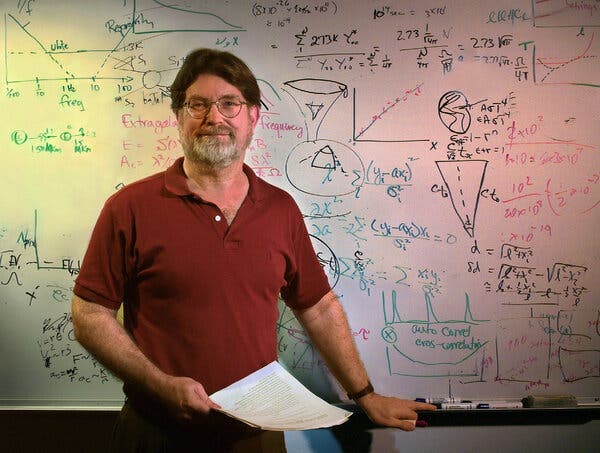Science
George F. Smoot, Pioneer of Cosmic Discovery, Dies at 80

George F. Smoot, a renowned American physicist and Nobel laureate, passed away on September 18, 2023, at the age of 80 in his home in Paris. His sister, Sharon Bowie, confirmed that he died from cardiac arrest. Smoot was instrumental in advancing our understanding of the universe’s origins, particularly through his work with the Cosmic Background Explorer (COBE) satellite.
As a research scientist at the Lawrence Berkeley National Laboratory and the Space Sciences Laboratory at the University of California, Berkeley, he played a key role in constructing a detailed image of the early universe. This endeavor utilized a pioneering instrument he developed in the 1970s, which was launched into space in 1989 aboard NASA’s COBE. The satellite detected minute temperature variations in the cosmic microwave background, the afterglow of what is believed to be the Big Bang, providing crucial evidence for the universe’s structure and evolution.
Dr. Smoot’s groundbreaking findings were revealed in 1992 during an American Physical Society conference. He famously stated, “If you’re religious, it’s like seeing God.” The announcement made headlines worldwide, including a front-page story in The New York Times, highlighting the profound implications of his work. Esteemed theoretical physicist Stephen Hawking described it as “the greatest discovery of the century, if not of all time.”
Significant Contributions to Cosmology
Smoot’s research built upon earlier discoveries made by physicists Arno A. Penzias and Robert W. Wilson, who, in 1964, established that the universe was filled with the remnants of ancient light, further supporting the idea of a Big Bang origin. This breakthrough transitioned cosmology from a speculative field to a science grounded in empirical data.
Through the COBE satellite, Dr. Smoot and his team provided the first precise measurements linking the cosmic microwave background to the Big Bang, confirming that the universe was once extremely hot and dense. The temperature of this background light was found to be an astonishing 2.7 kelvin (approximately minus 455 degrees Fahrenheit), just above absolute zero. Smoot described the challenge of detecting fluctuations in that temperature as akin to “listening for a whisper during a noisy beach party.”
These findings not only affirmed the Big Bang theory but also bolstered evidence for dark matter and the theory of cosmic inflation, which posits rapid expansion of the universe shortly after its inception. Smoot’s work paved the way for subsequent missions, including the Planck observatory, launched by the European Space Agency in 2009.
A Complex Legacy and Educational Outreach
In recognition of his contributions, Dr. Smoot shared the 2006 Nobel Prize in Physics with John C. Mather, another leader of the COBE project. While celebrated for his intellect and contributions, Smoot also faced criticism from peers who felt he sometimes claimed undue credit for collaborative achievements. This tension was evident in the lead-up to the 1992 announcement when a Berkeley Lab press release was perceived as attributing the discovery primarily to him.
In his 1993 book, “Wrinkles in Time: Witness to the Birth of the Universe,” co-authored with Keay Davidson, Smoot recounted the journey leading to the COBE findings. Dr. Mather later published his own account, titled “The Very First Light,” which presented differing perspectives on their shared experiences.
Born on February 20, 1945, in Yukon, Florida, George Fitzgerald Smoot III was influenced by a family deeply rooted in science and education. He earned degrees in physics and mathematics from the Massachusetts Institute of Technology (MIT) and completed his Ph.D. in particle physics in 1970. His career in cosmology began under the mentorship of Nobel Prize-winning physicist Luis Alvarez at Berkeley.
Later in his career, Dr. Smoot became increasingly focused on public outreach and education. He initiated programs aimed at teaching high school teachers and students about cosmology and even taught an online course about gravity that attracted over 87,000 participants. His appearances on popular television shows, including the CBS sitcom “The Big Bang Theory,” and his participation in the game show “Are You Smarter Than a Fifth Grader?” further showcased his commitment to engaging the public with science.
Dr. Smoot is survived by his partner, Nóra Csiszár, and his sister. His legacy will endure through his contributions to science and education, inspiring future generations of scientists and educators. As he once noted during his game show appearance, his efforts were aimed at encouraging students to explore new opportunities, reinforcing the idea that curiosity and inquiry are essential to understanding our universe.
-

 Lifestyle5 months ago
Lifestyle5 months agoLibraries Challenge Rising E-Book Costs Amid Growing Demand
-

 Sports4 months ago
Sports4 months agoTyreek Hill Responds to Tua Tagovailoa’s Comments on Team Dynamics
-

 Sports4 months ago
Sports4 months agoLiverpool Secures Agreement to Sign Young Striker Will Wright
-

 Lifestyle4 months ago
Lifestyle4 months agoSave Your Split Tomatoes: Expert Tips for Gardeners
-

 Lifestyle4 months ago
Lifestyle4 months agoPrincess Beatrice’s Daughter Athena Joins Siblings at London Parade
-

 Science4 months ago
Science4 months agoSan Francisco Hosts Unique Contest to Identify “Performative Males”
-

 World4 months ago
World4 months agoWinter Storms Lash New South Wales with Snow, Flood Risks
-

 Science5 months ago
Science5 months agoTrump Administration Moves to Repeal Key Climate Regulation
-

 Business5 months ago
Business5 months agoSoFi Technologies Shares Slip 2% Following Insider Stock Sale
-

 Science5 months ago
Science5 months agoNew Tool Reveals Link Between Horse Coat Condition and Parasites
-

 Sports4 months ago
Sports4 months agoElon Musk Sculpture Travels From Utah to Yosemite National Park
-

 Science5 months ago
Science5 months agoNew Study Confirms Humans Transported Stonehenge Bluestones









